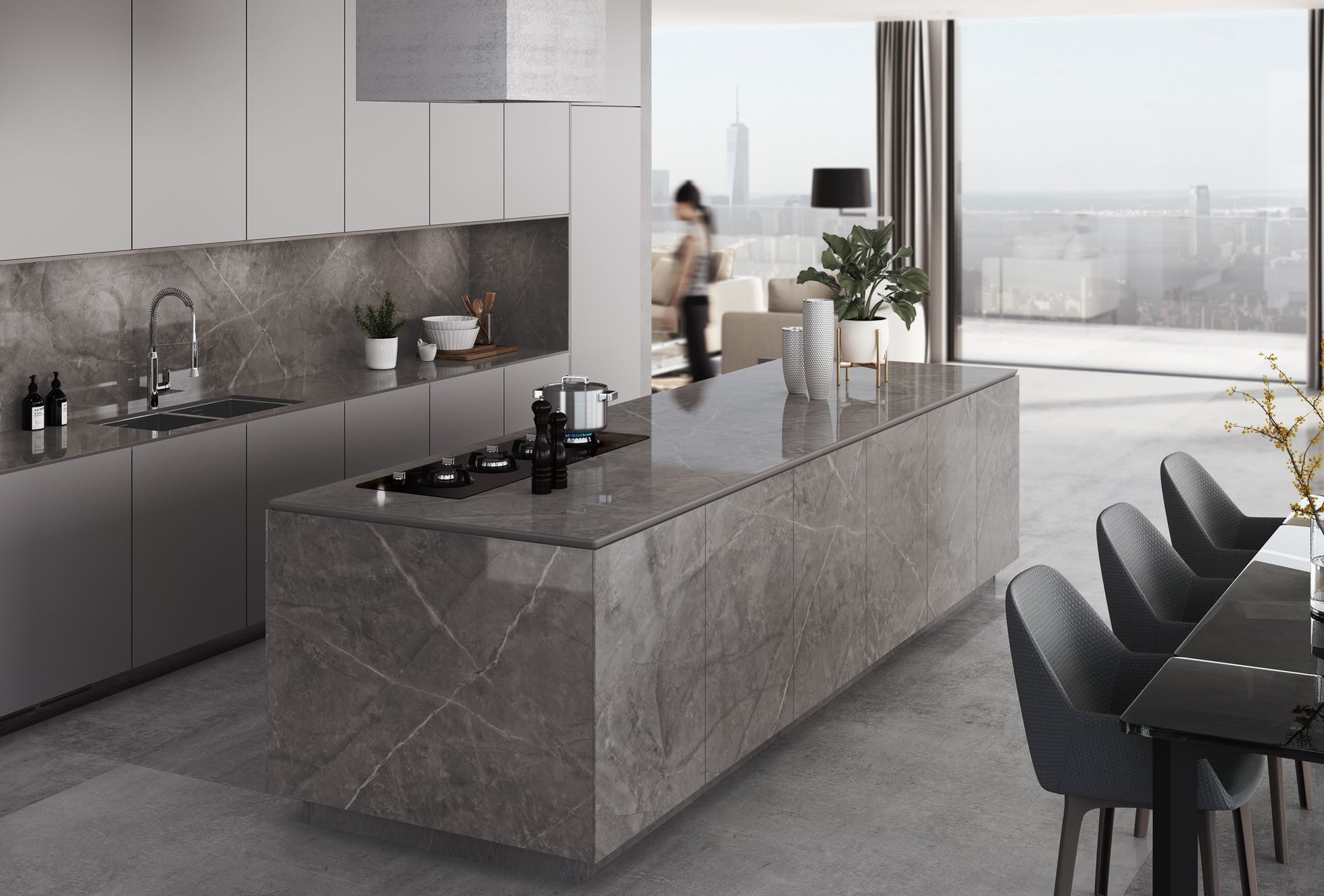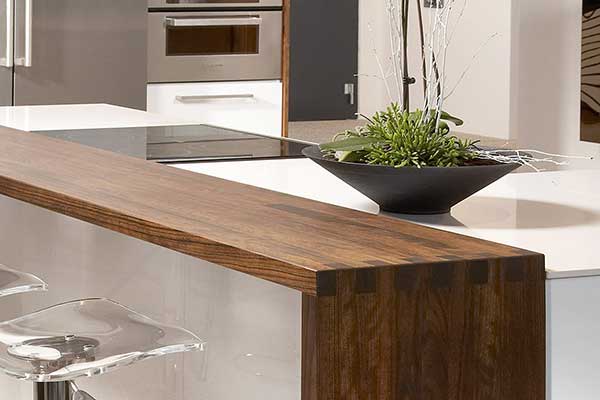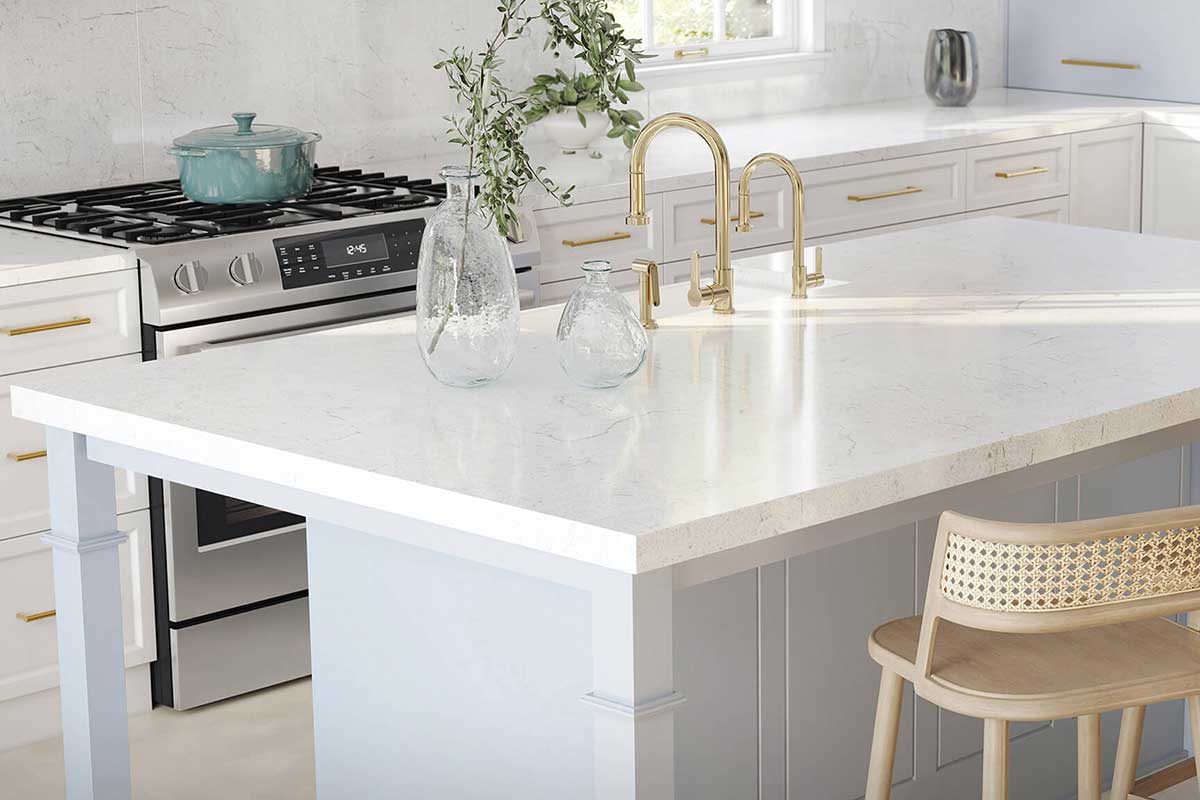
Main Types of Kitchen Worktops: A Guide
It's worthwhile knowing the main types of kitchen worktop available to you, so you can make an informed choice when it comes to buying a new one or replacing your current worktop. Worktops are arguably the most important part of any kitchen, bathroom or living area since it is often the first thing that anybody notices and it can make or break the aesthetic appearance of a room.
Quality of the Kitchen Worktop
The quality of the kitchen worktop you choose will also determine the lifetime of your kitchen and how long the design remains in fashion. It is important to make a wise decision to also make your kitchen worktops endure any mishaps – from food stains to hot water damage.
Technical innovations in the 21st century
During the past few years, the quality of kitchen worktops have advanced dramatically, allowing for an abundance of options at every level. You may choose from a huge variety of super tough and ultra-luxurious worktops in different materials, colours, textures, thicknesses and price ranges to suit every budget, style or taste.
How to Choose The Right Kitchen Worktop
This article attempts to give an outline of the best and most popular types of kitchen worktop materials to help you choose the right worktop for you.
Comparison of Main Worktop Types
Ultra-Compact
Ultra-compact kitchen worktops are made of a revolutionary new material, called sintered stone, that replicates aesthetic qualities of marble and granite worktops, but improves on their beauty, structural strength, hardness, and density. Ultra Compact worktops are formed by mixing elements of glass, porcelain and quartz and sintering them under extreme pressure and heat, just below the point of melting them. The addition of natural granite and minerals such as quartz and feldspar, provide the strength, while Silica, glass, and porcelain, provide extra stability. The unique fabrication process gives the ultra-compact worktops greater flexibility than granite or marble worktops and therefore they do not break or crack. Natural oxides are blended in with the mixture during the high-tech manufacturing process to provide the desired colours and veins throughout the thickness of the worktop, and during the compression phase, different finishes and textures are ingrained.
Main qualities of Ultra-compact
Sintered stone is completely UV-stable and chemical resistant, which means it is completely colour-fast so solid colours do not fade over time. It also makes them eminently suitable for outdoor kitchen use because they will not be damaged by the sun’s ultraviolet rays. The heat resistance of ultra-compact sintered stone surpasses any other worktop material available and they will not be damaged by hot pans or pots. Sintered stone is an almost indestructible material that is perfect for bathroom and kitchen worktops, floor and wall cladding, furniture, facades, stairs, and a multitude of other hard wearing surfaces and architectural or building applications, both indoors and outdoors.
Choices of colour, pattern, and textures
The wide array of colours and veins are embedded throughout the material for the ultimate luxurious appearance, colour stability and colour matching across slabs and eliminates the need for edging.
Special qualities
Because of its immense strength and hardness, Ultra-Compact worktops can be manufactured in larger sheets than other worktops, making it incredibly versatile. It is also possible to use thinner slabs, thereby reducing weight and cost.
Advantages and disadvantages of Ultra-compact:
- Super luxurious; engineered stone is exquisitely beautiful..
- Zero maintenance. Super durable, almost indestructible. 100% UV resistant and the colours will never fade. Completely heat and fire-proof.
- It will not be damaged by chemicals or water. Does not require sealing.
- They are 100% UV resistant and the colours will never fade.
- Colour is consistent throughout material and across worktop slabs.
- They are available in a wide range of patterns, textures, colours, and finishes.
- Chips are easy to repair and the worktops come with a colour-matched repair kit.
- Can be used anywhere, both indoors and outdoors.
- Ultra-hygienic. Antimicrobial ingredients actively fight bacteria.
- Exceptional strength makes it possible to use thinner slabs to save on weight,
- The joints are virtually seamless, creating a unified appearance, especially when integrated basins and sinks are installed.
- More expensive than marble or granite worktops.
- Because of its exceptional hardness, can chip, but can easily be repaired
- Available only at approved dealers.
- Not possible to install it yourself. Can only be installed by professional installers.
- Edging and accessories are limited to certain colours, patterns, and textures.
Quartz
(Such as Silestone, Diore, Caesarstone, Compac, Technistone)
What is a quartz worktop made from?
The beautiful three-dimensional crystal-like Quartz kitchen worktops are made from re-engineered natural quartz, which is the hardest worktop material known to man.
The top end of luxury, premier quartz worktops are made from engineered stone, manufactured through a special heat and vibro-compaction process.
They are manufactured by combining a minimum of 90-94% ground natural quartz, with 6-10% resins, polymers, and colour pigments.
Main qualities of a quartz worktop
A quartz worktop is completely nonporous and ultra-hygienic, easy to clean and actively resists heat, water, bacteria, and stains.
They also contain silver ions as an active ingredient that fights bacteria.
Choice of colours, textures, and patterns
Quartz worktops are available in a vast array of colours and surface textures.
Advantages and disadvantages of quartz:
- Sophisticated and luxurious.
- Unique radiant crystal-like, 3-dimensional sparkle.
- Fit any kitchen and bathroom design or style.
- Joints are virtually seamless and create a uniform appearance.
- Ultra-hygienic and actively fight bacteria.
- Hardest of all worktop materials. Will not be damaged by knocks or items dropped on the worktop surface.
- Completely non-porous. They do not absorb any liquid and will not stain.
- Can be thermoformed, moulded, and shaped during the manufacturing and fabrication process.
- Range of 60 vibrant colours, some with a crystal-like appearance.
- Colour consistent within the slab and across slabs than natural stone such as marble, granite, sandstone, or slate..
- More expensive than most types of kitchen worktop.
- Installed by professional installers; DIY is not possible.
- Sudden, extreme temperature changes can cause damage.
- Prolonged exposure to the sun can fade colours, making them unsuitable for outdoor use.
- Can only be repaired by professionals.
- Not suitable for outdoors in conditions where they are exposed to extreme conditions.

Solid Surface
(Such as Corian, Diore, Hanex and HiMacs) Solid surface kitchen worktops are a magnificent improvement on many natural worktops. All the imperfections, fissures and cracks are eliminated from the original marble or granite, while enhancing their beauty and improving all the natural qualities.
What is a solid surface worktop made from?
Solid surface worktops are created from a unique composite of pulverised natural minerals and pure acrylic polymer. The manufacturing process retains the natural appearance of marble and granite, while improving the strength, durability, and hygiene factors of the natural minerals
Main Qualities
Solid surfaces are created to last a lifetime. The stone-hard kitchen worktop can be shaped, moulded, sanded, engraved, and fabricated to meet any design requirements. It is completely non-porous, easy to clean and maintain and is highly resistant to stains.
Choice of colours, textures, patterns and accessories
They are available in a very wide array of colours, textures and patterns to emulate the qualities and appearance of natural marble, granite, sandstone, slate or other natural stone. Integrated moulded sinks and bowls with drainer grooves, upstands and downturns, and accessories are fabricated in the same colour - and because joints are almost invisible - the completed kitchen or bathroom has a truly uniform appearance, as if everything has been cut from a solid block of marble or granite.
Advantages and Disadvantages of Solid Surface:
- Extremely luxurious. Improves natural beauty, quality and elegance of marble, granite kitchen worktops, or other polished stone.
- Highly durable and damage resistant. Stronger and more resilient than marble or granite.
- They will always remain in fashion and fit any kitchen design and style.
- The joints are virtually seamless, creating a uniform appearance.
- Completely non-porous. They do not absorb liquid and will not stain.
- Versatile. Can be thermoformed, routered, engraved, and shaped in a special heat process.
- Available in a range of 80 colours, from natural and extra lights and neutral colours to vibrant, bright colours.
- More colour consistent, both within the slab and across slabs, than natural marble or granite.
- More expensive than marble kitchen worktops or granite kitchen worktops.
- Sudden, extreme temperature changes can cause damage.
- The worktop surface is vulnerable to scratches, although it can be repaired easily with a repair kit.
- The worktop surface can be damaged by certain chemicals.
Stone
Solid stone kitchen worktops are completely natural and are synonymous with luxury. They are tough, durable, easy to clean and heat resistant.
Types of natural stone worktops
Solid worktops made of Sensa Granite, Granite, Marble and Limestone are fabricated from individual slabs, which guarantees each slab is unique and has its own characteristic touch of elegance.
Maintenance required
Natural stone has fissures and is not completely non-porous, but the best brands of worktops use only top-quality slabs and superior sealants are used to protect the worktop surface.
Advantages and disadvantages of Natural Stone:
- Each slab is unique.
- Marble, granite, limestone and sandstone worktops have a timeless beauty and luxurious quality.
- They will always remain in fashion and fit any kitchen design and style.
- Solid stone is highly durable. If treated properly these countertops will last for generations.
- Granite worktop is more scratch resistant than marble countertops, which in turn is more scratch resistant than limestone (which is the softest).
- All types of stone are highly resistant to heat.
- Low maintenance. The most important maintenance required is regular sealing.
- Stone can be prefabricated to any shape.
- Can be matched to almost any other material.
- Generally more expensive than solid wood, glass, stainless steel, or laminate.
- They contain natural fissures and tiny pores. The worktop can crack if not supported properly.
- The natural micro-pores mean they can absorb liquids and might stain as a result.
- Joints are visible and colours and patterns will not match across the joint. For most people, this is part of the natural appeal though.
- Sudden, extreme temperature changes can cause damage.
- Only minor damage can be repaired DIY. It requires professional skills and equipment to do major repairs or to re-polish the surface.
- Very heavy and requires good support.
- Limited range of colours and patterns.

Wood
The appearance of solid wood kitchen worktops improves with age as the wood matures and the surface develops a unique patina (gloss or sheen), causing its natural colour to become deeper and enriching its appearance.
The best types of timber used for worktops
Oak, maple, beech, cherry, elm, iroko, walnut
Maintenance required
Top-quality wooden kitchen worktops are hard-wearing, resistant to heat and impact and easy to repair. If properly sealed and sterilised at regular intervals, water does not penetrate the surface and if properly done, the almost seamless joints do not leave crevices for germs to accumulate. Scratches can easily be sanded out and even more severe damage can be repaired with some skill and the right tools.
Special qualities of solid wood worktops
Even if bacteria do enter the wood fibre, they do not multiply and can easily be disinfected. Solid wood bathroom and kitchen worktops are strong and very resilient and if cared for properly they can last a lifetime.
Advantages and Disadvantages of Wood:
-
Different types of wood each have their own colour, grains and patterns, giving wooden worktop surfaces a stunning beauty.
-
The appearance of a wood worktop improves with age, gaining more character.
Wood has a timeless style and will always remain in fashion. -
Wood lends itself to a variety of kitchen designs, from traditional to modern and contemporary.
-
Joints almost invisible, creating a uniform appearance.
-
Wooden worktops are highly durable. They can withstand heavy knocks and will last for generations.
-
Each worktop is unique. No two pieces of wood are ever the same.
-
They are highly resistant to damage and can be easily repaired DIY.
-
Wood contains natural antimicrobial qualities, actively fighting bacteria.
-
Low maintenance. The most important requirement is regular sealing.
-
Wood can be cut to any shape and size.
-
They can be used outdoors if properly sealed and protected from the sun.
-
Wood is eco friendly and sustainable.
- Some wood species are expensive and generally, wooden kitchen worktops are more expensive than glass, stainless steel and laminate worktops.
- Can be water damaged and absorb stains, if not sealed properly.
- Can be scorched by high heat.
- Prone to scratch marks (although these can be easily repaired.)
- Not all types of wood are suitable for worktops.
- Need self research to ensure you invest wisely in the right type of wood.
Glass
Glass countertops are available in a wide variety of styles, colours, and textures in new or recycled glass. Designs that stretch the imagination are possible with a glass worktop because it can be shaped and formed into an endless number of different eye-catching styles. Variations are possible with recycled pieces of crushed glass set in acrylic or concrete, and can either give the appearance of glass floating in liquid or arranged artistically for a mosaic-like look.
Advantages and Disadvantages of Glass:
- The crystal-like, satin, or matte finishes, or engraved or printed surfaces can be very attractive and glass can be matched to most other materials.
- A glass worktop is recyclable and thus eco-friendly.
- Treated or toughened glass countertops are very durable and if properly cared for will last for generations.
- Easy to clean and very hygienic.
- Very versatile. Can be shaped and formed to any shape, size, and texture.
- Available in various thicknesses and sizes.
- Highly resistant to chemicals.
- Completely non-porous.
- Can be engraved or printed with patterns on the rear side.
- Treated glass can be very expensive, especially if customised.
- Prone to damage and expensive to repair or replace.
- Can be heavy and requires good support.
Stainless Steel
A stainless steel worktop may not ordinarily exude the luxury of quartz, solid surface, marble, granite, or wooden kitchen worktops, but the top brands can be aesthetically very pleasing and modern. In certain work-areas stainless steel is very practical because it is water resistant, heat resistant, and stain resistant . No type of liquid or substances can penetrate the material at all and they can easily be cleaned. It is important to use good quality thicker gauge stainless steel (14-18 gauge) for durability and resistance to dents and scratches.
Advantages and Disadvantages of Stainless Steel
- Stainless steel worktops are relatively inexpensive
- Highly durable. They do not rust, are heat resistant, water resistant and stain resistant.
- Very hygienic and easy to clean.
- Recyclable and eco-friendly.
- Fairly lightweight and can be fitted easily.
- Perceived as a workhorse , not stylish. There are exceptions.
Can be damaged by certain chemicals. - Prone to scratches, although light scratches can usually be polished out.
- Noisy, with cutlery, pots and pans clashing and clanging.
- Choose only the best quality stainless steel worktop. Lower grades easily dent, scratch, or even tear.
- Stainless steel ages over time and the steel becomes dull if not cleaned and polished regularly.
Laminate
As a generally cheaper option, laminate kitchen worktops have always been popular. The laminate covering the substrate is nonporous and does not absorb water and food spills and the surfaces are easy to clean. However, the substrate can absorb water and distort if not sealed properly.
New Technology
The development of laminate worktops has come a long way in the past decade and popular brands such as Formica and Wilsonart offer a large variety of attractive styles, colours and textures. A laminate kitchen worktop is versatile and can be cut into just about any shape or size and the edges can be covered by strips in the same colour. If special care is taken with the laminate worktop to seal ends and joints, they are pretty hygienic.
Advantages and Disadvantages of Laminate Worktops:
- Laminate worktops are cheaper than most other options.
- Easy to install DIY.
- Can imitate almost any other material and the top-quality laminates are quite attractive.
- Top-grades are quite durable if proper precautions are taken.
- They are available in a very wide range of colours, textures, patterns, and thicknesses.
- The laminate is only a thin layer on top of the substrate and can easily be scratched or damaged by sharp instruments and heavy knocks.
- Only very slight damage can be repaired.
- Not good for resale value of house.
- Although the front edges may be pre-formed or rounded, any cut edges have to be covered by strips that are glued on and do not generally have a solid appearance.
Concrete
Especially in outdoor entertainment areas, well-designed concrete worktops have become more popular, because they are highly resistant to the elements.
To make them aesthetically attractive, materials such as glass fragments, natural stones, shells, and fibre-optic lights can be embedded.
Advantages and Disadvantages of Concrete:
- Relatively inexpensive
- Highly durable and heat resistant, scratches, and impact damage.
- Very versatile and lends itself to great creativity.
- Can be shaped, moulded, coloured, textured, to simulate marble and granite worktops.
- Unless imaginatively created, they can be perceived as dull or unattractive.
- Can crack, although this can easily be repaired.
- Susceptible to stains if it is not properly and regularly sealed.
- Heavy and requires good support.
- Porous. If not sealed properly and regularly, it will absorb liquids which can damage it from the inside.
- Unless properly sealed, it is not as hygienic and easy to clean as most of the other materials.





